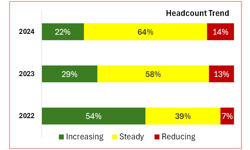So where do you begin? Give the right person a phone, an old Excel sheet of names, a 1-hour product briefing and sit back and watch the money come in? Perhaps not. That may be how your business first started, but it’s not a sustainable and reliable sales approach. So what is?
Let’s start with the most obvious barriers to sales success:
* A Barometer not a Sticking Plaster
Sales is not a sticking plaster for a business that has other problems but it can be a barometer for a good corporate strategy. In a growing, successful business, there is often a sales-led culture. Conversely, when things aren’t going well, sales often takes the brunt of the blame. If sales isn’t performing, make sure it’s not because other parts of the business are failing or the overall strategy is wrong. And if things are going well, ensure sales is enabled to make as much hay as it can, while the sun shines.
* The Market Doesn’t Want Your Product
If sales isn’t performing, you will have considered but may not have faced the horrible truth, that the market might fundamentally not want your product or service. In post-start up and more mature businesses, there are usually other indicators of a general market interest in the company’s product or services than sales performance. This might be decent renewal rates, regular repeat business or a steady flow of inbound leads (some of which convert to customers). If you have none of these indicators, pay attention before you start throwing sales resource at your business or at least do so with the knowledge sales might decrease the rate of decline but probably won’t enable the business to buck the trend entirely.
* The Wrong Marketing Mix
Another reason for poor sales performance can be the sales and marketing strategy. A sales and marketing strategy will include identifying market segments to target and how to get at those people. Sales is one of the channels in that mix. Make sure the strategy joins up sales and marketing approaches and considers which type of sales, if any, is likely to be most effective. Some products and services lend themselves to being sold via marketing more than sales and vice versa, most are a mix of the two. Getting this mix wrong will mean sales won’t perform.
If you’re confident the strategy, product, and marketing mix is right, then it’s time to look under the bonnet, at the sales operations itself.
Sales Operations
Optimising your sales operations means maximising the efficiency and effectiveness of a sales team’s people, processes and technology. These three elements make up the operational sales environment. It is an increasingly complex environment which means problems can be tricky to solve but usually there are profit-increasing opportunities lurking which can be exploited.
1. People
When it comes to recruiting, training, managing, motivating, and ultimately troubleshooting sales peoples’ performance, it is especially hard to get it right or conversely to fix things when they’re going wrong. If you’re struggling, you are not alone. You need to be a detective to work out where the problems lie and then have great people management skills and sound judgement to fix them.
Before you Recruit
Before you recruit, know exactly what sales role you need to fill and how the role fits into the overall team or business. Do you need telesales, field sales, account handling, new business, repeat business sales people? Also be sure you know where their leads will come from, what ROI you want, what their revenue targets will be and how the commission deal will be structured. Make sure, on paper, it looks realistic and achievable. Think, “Could I achieve this?”, before you ask someone else to. If you’re fixing problems, consider whether you did this well for the current team. If not, go fix it. It’s never too late to make structures and roles clearer.
If marketing is responsible for lead generation, make sure you talk to them if you’re expanding the sales team. One telesales person can devour data at a rate most people underestimate. This problem exists in many small businesses right now. If so, tackle it. You’re throwing money down the drain.
Recruitment
Recruiting good sales people is very hard. But be fussy. It’s costly getting the wrong person in – both in terms of direct cost and lost revenue opportunities. Ensure whoever is doing recruiting really knows what sales is about.
Sales recruitment is very much about identifying interpersonal skills. Create a list before you start interviewing, don’t be afraid to use personality profiling techniques and do a thorough job of interviewing and reference checking.
Here are some things that might be on that list: Empathy * Listens well * Adjusts what they’re saying to what they’re hearing * Apparently effortless rapport building * Can think on their feet * Steers the conversation * Negotiates well * Handles objections effectively * Can close * Demonstrates commercial acumen * Sociable and likeable * Credible * Team player * Organised and well prepared * Presentable * Behaves normally and has good manners * Motivated by sales success * Communicates simply and clearly * Smart (not academic but nous / common sense / worldly) * No sign of victim mentality * Keen but not desperate to get the job
Train, manage and motivate
Sales training is rarely done well because corners are cut or steps are missed. If you want a good result, be patient and do them all properly.
i. When they start
Train them on the product, the pricing, their deal “wiggle” room, the market and educate them about your tried and tested sales process. Give them a lot of time at first, sell jointly, listen in on their calls and vice versa, attend meetings together.
ii. Coaching
In the first few months, make sure you’re coaching and advising and doing all you can to help them sell. Don’t leave them to get on with it, until they’re selling well.
iii. Don’t stop managing
You should start to see them succeed and then you can start to back off. Keep coaching but reduce the frequency and talk to them about how they want to be managed; everyone is different.
Sales teams, more than most, need constant and very strong reinforcement of success. Ring bells, give out prizes, whatever it takes.
iv. Limit distractions
One of the main reasons sales people don’t perform is because they’re not actually doing the job of selling. Ring fence your sales team and protect them from distractions.
v. Sales managers
Managing sales people is best done by someone who can sell, but isn’t expected to. If you can afford it, let them do sales management all the time but don’t expect a great sales person to be a great sales manager. It’s a different set of skills.
vi. Are they a keeper?
It’s tough, but don’t keep a poor-performing sales person. Be sure it’s them and that you’ve really done all you can to train and motivate them, but otherwise, within the first six months, decide whether they are good or not, and if not, let them go.
Targets and Commissions
Make sure you set very clear targets and commission structures. Nothing is more demotivating then moving targets or expected commission being withheld or disputed. And don’t cap commission. If your business can’t afford the commission, the structure of the commission deal is wrong and it needs fixing. If the commission structure is right, the ROI will be right and there’s no need for capping.
2. Process
Your business should already be learning all the time about its sales process and constantly seeking to refine and improve it, but it may not have made that process explicit and shared the knowledge between the sales people. Some companies take this to an extreme where the sales force is following a totally locked down process from the moment the lead hits them to the closing of the deal. Some businesses are far more free-flowing. Find the balance that’s right but, to optimise your sales operations, there must be a process and everyone should follow it if you are to measure, improve and forecast effectively.
The complexity of the process and sophistication of the measurement should correspond to the size and complexity of your business. The basics for smaller businesses (deal stage, revenue per sales person, conversion rates etc), but for advanced businesses, knowledge of deal velocity, LTV per sales person and other metrics can make small percentage point differences to sales performance which translate into big absolute numbers impact to the bottom line.
3. Technology
You cannot have an effective sales team unless you are using some form of productivity tool and Excel is not a viable option. There must be somewhere that a sales person stores their contact names and notes and schedules reminders and follow ups for themselves. That, at the most basic, is technology you must have because otherwise your bucket is leaking and without doubt money is falling out of it.
The golden rule of technology is, it enables sales optimisation but only because it supports productivity, process and measurement; it is not a solution in itself.
Summary
Optimising your sales operations is a careful balance of science and art. The art of good management and people skills and the science of measurement and process improvement. It’s hard but the results can be very rewarding for your business and your sales team.










